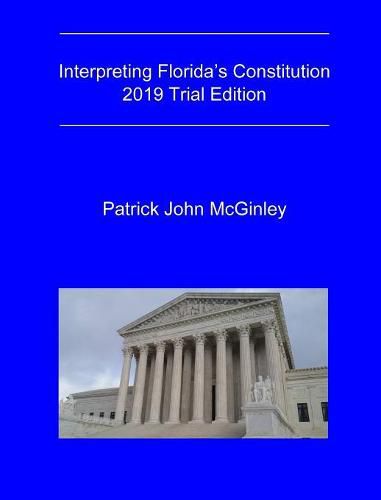Readings Newsletter
Become a Readings Member to make your shopping experience even easier.
Sign in or sign up for free!
You’re not far away from qualifying for FREE standard shipping within Australia
You’ve qualified for FREE standard shipping within Australia
The cart is loading…






This 2019 update of a popular law school casebook analyzes the Constitution of the State of Florida. It begins with the idea of a state being a laboratory of democracy where rights may be expanded or invented within the minimum requirements of the federal constitution. It explores the question of how a state constitution can produce its own jurisprudence in light of the supremacy of the United States Constitution. It outlines the canons of construction for the Florida Constitution. It introduces the concept that a state constitution can be a source of heightened civil liberties and fundamental rights. It explores this issue in greater detail by using the Florida Constitution as an example. It identifies Florida Constitutional rights without an exact parallel to those in the text of the US Constitution and asks whether Florida has taken its own path in interpreting or implementing the identified constitutional rights. It introduces rights enumerated in the text of the Florida Constitution that are not embodied in the text of the US Constitution. In so doing, it compares Florida’s approach to those of other state constitutions. It addresses the familiar refrain that unlike the federal constitution a state’s constitution is a restriction upon power not a grant of power. It looks at state constitutional criminal procedure by examining the ancient origin of the jury and the recent origin of Florida criminal procedure. Finally, it examines the US Supreme Court’s acceptance of a state’s inherent police power, and state-by-state differences in zoning and nuisance law, so as to better understand how eminent domain and inverse condemnation may differ under state constitutions such as Florida’s. Hardbound, approx. 630 pages. Current as of July 21, 2019.
$9.00 standard shipping within Australia
FREE standard shipping within Australia for orders over $100.00
Express & International shipping calculated at checkout
This 2019 update of a popular law school casebook analyzes the Constitution of the State of Florida. It begins with the idea of a state being a laboratory of democracy where rights may be expanded or invented within the minimum requirements of the federal constitution. It explores the question of how a state constitution can produce its own jurisprudence in light of the supremacy of the United States Constitution. It outlines the canons of construction for the Florida Constitution. It introduces the concept that a state constitution can be a source of heightened civil liberties and fundamental rights. It explores this issue in greater detail by using the Florida Constitution as an example. It identifies Florida Constitutional rights without an exact parallel to those in the text of the US Constitution and asks whether Florida has taken its own path in interpreting or implementing the identified constitutional rights. It introduces rights enumerated in the text of the Florida Constitution that are not embodied in the text of the US Constitution. In so doing, it compares Florida’s approach to those of other state constitutions. It addresses the familiar refrain that unlike the federal constitution a state’s constitution is a restriction upon power not a grant of power. It looks at state constitutional criminal procedure by examining the ancient origin of the jury and the recent origin of Florida criminal procedure. Finally, it examines the US Supreme Court’s acceptance of a state’s inherent police power, and state-by-state differences in zoning and nuisance law, so as to better understand how eminent domain and inverse condemnation may differ under state constitutions such as Florida’s. Hardbound, approx. 630 pages. Current as of July 21, 2019.